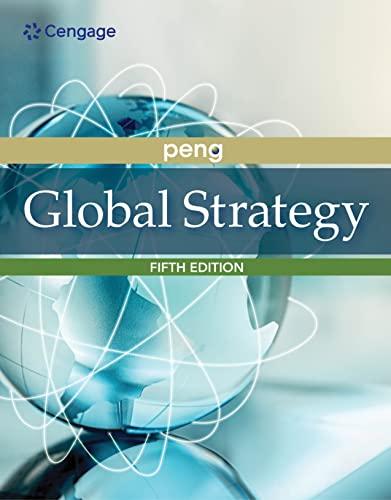Question
Technology for the public sector for now and beyond: Governments and the Megatrend Enabling Technology A major focal point on the digital agenda of governments
Technology for the public sector for now and beyond: Governments and the Megatrend Enabling Technology A major focal point on the digital agenda of governments besides infrastructure is data, open data. Some evidence shows that by fully exploiting public sector data, governments could reduce their administrative costs. These estimates do not include the additional benefits that would arise from greater access to and more effective use of public-sector information. Such benefits can be obtained from weather forecasts, traffic management, crime statistics, improved transparency of government functions (e.g. procurement) and educational and cultural knowledge for the wider population. Another driver of change in this cluster is, of course, Big Data. Predictive analytics enables proposed policy changes in one system to be mapped against their flow-on impact to all systems. As a result, we can have, and in some cases already have, deep insights into the trade-off between public policies regarding other major mega trends like water, energy, air and climate. At a local level there is more insight as well. Fire departments use advanced analytics to evaluate risk of fire in different places and manage their inspections accordingly. Police services use advanced models to predict where certain types of crime are likely to happen under certain conditions. Automated advanced models to support risk based inspections and supervision to support supervisory bodies are available and integrated in the rule and workflow based systems. The digitization also presents a significant new type of risk in the form of cyber security challenges. Governments already face pressure to protect their citizens, their own operations and the security of their nations from threats not seen before. This will increase even more. The European Union Institute for Security Studies predicts that "over the next two decades, the cyber sphere is likely to become an arena of conflict and tension between states of all political stripes, not least among those for which cyber security is a key component of intelligence and military strategy, and also between individuals or private companies." It can't just be all about data? Besides the fact that the constant improvement and evolution of technology creates enormous opportunities for improved efficiency and improved decision making for governments I also see other opportunities now lining up. The integration of new technologies into the lives of people and businesses offers governments the challenge to reinvent the way public administrations communicate with both citizens and businesses. It offers opportunities for more collaborative and participatory relationships and challenges to actively shape political priorities, collaborate in the design of public services and participate in their delivery. The design of the new services models in thriving on collaboration are becoming more and more a reality. Collaboration with citizens and users plays an increasing role in the transformation of public services towards new forms of production and delivery. IT-enabled collaborative service production refers to any public service that is electronically provided by government, citizens, NGOs, private companies and individual civil servants, whether or not in collaboration with government institutions, based on government or citizens-generated data. While the public sector does have in most situations the prime role in ensuring that public value is created, its potential to do so is enhanced through cooperation with others. Acting as an open participation and collaboration platform, making data and information accessible, government can support an ecosystem of actors, both interacting organizations and individuals, thereby generating public value. Smart or maybe smarter cities are becoming more and more a reality. As a concept of course it goes beyond merely the use of IT. It is about smarter urban transport networks, upgraded water supplies and waste disposal facilities and more efficient ways to light and heat buildings. And it also encompasses a more interactive and responsive city administration, safer public spaces and meeting the needs of an ageing population. I think the main question is in what order the concept will be achieved. The boundary between what is considered public and what is considered private is blurring. The digital revolution has created a new generation of people who want ever more accessible, portable, flexible and customized products, services and experiences. They expect to move seamlessly, in real time, between the physical and virtual worlds and they are prepared to disclose quite a lot about themselves to achieve their desires. This of course demands acknowledgement of reinvented views on how to more effectively protect privacy and the realization of the economic and social benefits of trustworthy and innovative uses of personal data. As cross-border flows of data continue to increase, privacy protection regimes need to support open, secure, reliable and efficient data flows, while lessening privacy risks and enhancing responsible behaviour in the use of personal data. I think the new generation will be "digital natives" that are intimately familiar with digital technologies. Along with all the investments being done for educating people across all generations to have digital skills, we will be able to make the next step.
Question 1.1 (10 Marks) With reference to the case study, discuss how technology has improved efficiency and decision making for governments. Refer to the changes technology has had on Police and Fire Services.
ANSWER IN 300 WOR-DS ONLY.
Step by Step Solution
There are 3 Steps involved in it
Step: 1

Get Instant Access to Expert-Tailored Solutions
See step-by-step solutions with expert insights and AI powered tools for academic success
Step: 2

Step: 3

Ace Your Homework with AI
Get the answers you need in no time with our AI-driven, step-by-step assistance
Get Started


